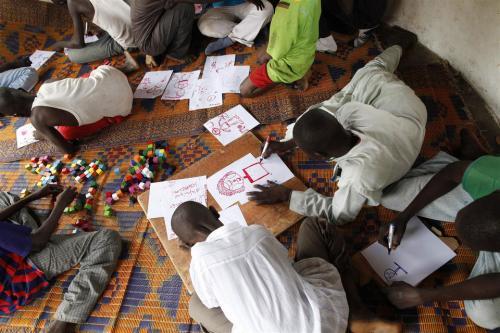Child recruitment by armed groups in Central African Republic must end – UN
The United Nations Children’s Fund (UNICEF) on Friday called on the Central African Republic (CAR) to immediately stop child recruitment by rebel groups and pro-government militias amidst reports of increasing use of this practice.

Former child soldiers draw in a UNICEF-assisted transit centre in the Central African Republic (CAR).
“A number of rebel groups and various pro-government militias have become more active in recent weeks in the capital city of Bangui and across the country,” said the UNICEF Representative for CAR, Souleymane Diabate. “Reliable sources have informed us that children are newly being recruited among their ranks. These reports are of serious concern.”
“Our team on the ground is working with partners to monitor, verify, and respond to grave violations of child rights, including recruitment into armed groups – those at greater risk are children who have lost their homes, are separated from their families or were formerly associated with armed groups,” Mr. Diabate added.
According to UNICEF, even before the latest round of violence in CAR erupted in December last year, about 2,500 children – both girls and boys – were associated with multiple armed groups, including self-defence groups, in CAR. The UN agency estimates that this number will rise because of the recent conflict.
Over the past weeks, widespread looting and violence occurred in the country as an alliance of rebel groups known as ‘Séléka’ attacked several towns in the northeast and threatened to march on Bangui. This week, the group reportedly halted their advance on the capital and agreed to start peace talks in Gabon.
CAR has a history of political instability and recurring armed conflict. State authority is weak in many parts of the country, which are largely controlled by rebel groups and criminal armed groups, according to the UN Department of Political Affairs (DPA).
Coupled with ethnic tensions in the north, frequent armed incursions by rebel elements from neighbouring countries and the presence of members of the armed Ugandan group known as the Lord’s Resistance Army (LRA), have added to insecurity and instability in CAR, which also has 170,000 people displaced internally.
UNICEF said more than 300,000 children have already been affected by the violence in CAR and its consequences, including through recruitment, family separation, sexual violence, forced displacement and having limited access to education and health facilities.
In particular, the agency is highly concerned about the involvement of youth under 18 years of age who may be forced to fight, carry supplies, perform other support roles and be abused as sex slaves by armed groups.
“Recent commitments under international law by the Government and some rebel groups to keep children out of the fighting must be respected,” said Mr. Diabate. “All violations must stop. It is critical that everything is done to protect these children and keep their families safe.”
UNICEF has worked in CAR since 2007 with both the Government and rebel factions to secure the release of more than 1,000 girls and boys from armed groups and self-defence groups and support their reintegration into families and communities.
However, the volatile security situation has hampered the delivery of humanitarian assistance to affected communities and has led UNICEF to relocate 14 international staff and consultants last week. The agency has established an operational crisis centre for CAR in the city of Yaounde, Cameroon, where it said it will continue to work with partners to conduct emergency activities.
In relation to the latest violence, Secretary-General Ban Ki-moon and the Security Council have condemned the attacks involving ‘Seleka’ and called for a halt hostilities. They have also called on both the Government and the rebels to resolve the current crisis through dialogue, and to abide by the 2008 Libreville Comprehensive Peace Agreement, which was signed by the Government and the three main rebel groups and which helped bring an end to conflicts inside CAR.
The Secretary-General’s Special Representative and Head of the UN Integrated Peacebuilding Office in CAR (BINUCA), Margaret Vogt, has remained in close dialogue with the key parties and has offered support to political negotiations.
Source: UN News
- 383 reads
Human Rights
Ringing FOWPAL’s Peace Bell for the World:Nobel Peace Prize Laureates’ Visions and Actions

Protecting the World’s Cultural Diversity for a Sustainable Future

The Peace Bell Resonates at the 27th Eurasian Economic Summit

Declaration of World Day of the Power of Hope Endorsed by People in 158 Nations

Puppet Show I International Friendship Day 2020

